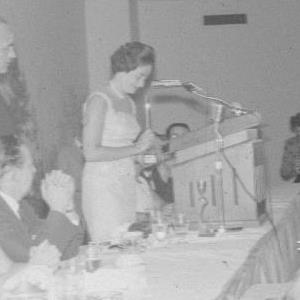
by Gideon Marcus

I didn't start Galactic Journey with the intention of it being a champion for progressive change. It just sort of happened. Our joining what's now being called the Second Wave of Feminism, and our frequent spotlight of woman and minority writers and characters, happened by degrees. I like a broad range of ideas and viewpoints, and it often takes an outsider to write works outside the mainstream. This is a big reason why we started covering British science fiction, and I'm glad we did. They are just entering what some have called a "New Wave," featuring some far out concepts and a more literary style.
Another reason for Galactic Journey's evolving focus is the make-up of our staff. Most of the team are women (about half of the articles are written by women), and we come from a diverse set of backgrounds and cultures. That makes us pretty unusual for even this modern year of 1963, and it follows that our tastes would be eclectic.
Of course, finding unusual authors can still be challenge — particularly these days. It is a rare month that the number of magazines featuring woman authors requires two fingers to count, and even though Cele Goldsmith has made a name for herself editing Amazing and Fantastic, her magazines don't often contain woman-penned pieces.
Nevertheless, women still make up a vital population within our genre, both professionally and as fans. In fact, several new female authors have come on the scene since the last edition of The Second Sex in SFF, many of whom have made a big splash, and who may well herald the beginning of a new upswing. Let's meet the new group:

L'Engle, who had only published one SF story back in '56, had determined to give up writing as a lost cause. After all, rejections are demoralizing (I grok!) and the income she was making just wasn't worth the time spent. But then the idea for A Wrinkle in Time came to her in '59, and she persevered through more than 30 rejections to publish what was one of the most spectacular sff books of 1962. I understand it's on the short list for the Newberry this year, and it certainly earned last year's Galactic Star for best novel.
So three cheers for L'Engle, who shows that the key to success is perseverance.

This newly minted author currently has two stories under her belt, both of them published in Fantastic. Her first, April in Paris so impressed us that we awarded her the Galactic Star. While Le Guin has not yet received any official accolades for her work, we suspect it's only a matter of time.

Anderson began her professional sf career writing with her husband, the rather famous Poul, in 1958. However, her fanac days started long before then, and her costumage at Worldcon is legendary. Since last year, she has burst out as an author and poet in her own right, mostly composing works with mythological themes. A talent on the edge of greatness, Karen has just begun to write.

Some authors are renowned in other fields, only occasionally dabbling in our genre. One such writer is Gertrude Frieberg (formerly Tonkonogy), who is much better known for her plays, Three Cornered Moon and Town House and the collection Short Story 2 (which features several of her works) than her single SF piece, The Short and Happy Death of George Frumkin . Still, we're happy she took the detour and hope she comes back some day!

I know very little about Sonya Dorman other than she hails from Connecticut, is fond of dogs, and is just beginning her sf writing career. Her first, The Putnam Tradition showed great promise. I hope we see more from her soon.

Let's wrap up with a star who is neither newcomer nor author, and yet, whose impact on the genre has been profound.
Goldsmith's career is a fascinating one. She started out in '55, at age 22, as a secretary for Howard Browne, who was editor of Amazing and Fantastic. Browne abandoned ship for a Hollywood career that year, and Paul Fairman took over, retaining Goldsmith. When he left for other pastures in 1958, Goldsmith ascended to the editorship of two magazines with proud but tarnished reputations.
In the last five years (coincidentally, the same span of time that the Journey has existed), she has turned both magazines around. In particular, I like the work that comes out in Fantastic, but Amazing often has worthy stuff, too. For this outstanding work, her magazines have perennially been nominated for the Hugo, and she, herself, won a Special Committee Award at the last Worldcon. She is truly an inspiration, proof that neither age nor origin are insurmountable barriers to success.





















